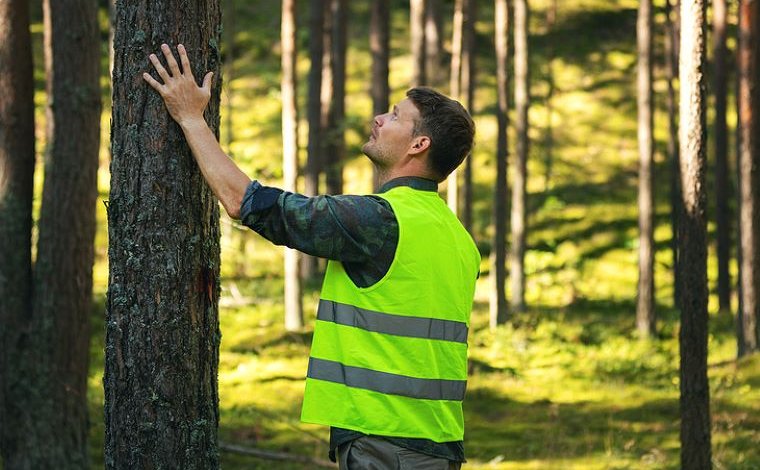
 Choosing paper products from sustainably managed forests encourages forest owners to have an economic incentive to maintain their forestlands rather than convert them to non-forest uses.
Choosing paper products from sustainably managed forests encourages forest owners to have an economic incentive to maintain their forestlands rather than convert them to non-forest uses.
Sept. 9, 2024 (Two Sides North America) - Forestry plays a crucial role in maintaining the health of North American ecosystems. Both the United States and Canada have implemented rigorous standards to ensure the sustainability of their forests, benefiting the environment and supporting the paper industry's responsible practices. Sustainable forestry practices and certifications like FSC (Forest Stewardship Council), SFI (Sustainable Forestry Initiative), and PEFC (Programme for the Endorsement of Forest Certification) use third-party auditing to ensure compliance with standards.
North American forests are vast and diverse, with the United States and Canada collectively managing hundreds of millions of acres of forestland. These forests are essential for biodiversity, carbon sequestration, and providing raw materials for various industries, including paper and paper-based packaging production. Responsible management and sustainable practices are critical for ensuring these forests remain healthy and productive.
Paper products sourced from sustainable forests help maintain and enhance forest health. Sustainable forestry practices, such as selective logging, reforestation, and conservation, ensure that forests remain productive and ecologically balanced. Selective logging means harvesting trees in a way that maintains the forest's structure and biodiversity. Reforestation is planting new trees to replace those that have been harvested. Conservation is protecting areas of high ecological value from logging and development. These practices ensure that forests continue to provide ecological, economic, and social benefits.
There is a misconception that the use of wood, paper, or paper-based products leads to deforestation when, in fact, it helps maintain and grow available forest land. Sustainable harvesting of trees to make products that benefit society is not considered deforestation (defined as the permanent conversion of forestland to non-forest use) because the trees will grow back. Deforestation occurs when forest lands are converted for things like agriculture, transportation, mining, or urban development.
Choosing paper products from sustainably managed forests encourages forest owners to have an economic incentive to maintain their forestlands rather than convert them to non-forest uses.
To support sustainable forestry, the United States and Canada adhere to rigorous certification standards such as FSC, SFI and PEFC.
Forest Stewardship Council (FSC). FSC certification ensures that forests are managed according to strict environmental, social, and economic standards. FSC-certified products are sourced from responsibly managed forests that provide environmental benefits and support local communities.
Sustainable Forestry Initiative (SFI). SFI certification focuses on promoting sustainable forest management in North America. It includes requirements for protecting water quality, biodiversity, and wildlife habitats.
Programme for the Endorsement of Forest Certification (PEFC). The PEFC works to protect our forests by promoting sustainable forest management through certification. This means we can all benefit from the many products that forests provide now, while ensuring these forests will be around for generations to come.
FSC, SFI and PEFC-certified forests are subject to regular third-party audits to ensure compliance with these standards.
The European Union Deforestation Regulation (EUDR) aims to ensure that products sold in the E.U. do not contribute to deforestation. While the goals of EUDR are commendable, the practical implementation poses challenges, particularly for North American forestry practices.
According to the American Forest & Paper Association (AF&PA), the E.U. relies on pulp and paper imports from the U.S., which exports around $3.5 billion worth of products to E.U. countries. The U.S. also supplies about 60% of the specialty pulp E.U. manufacturers use to make diapers, menstrual and incontinence products, and 85% of the specialty pulp used globally.
The complex supply chains and mixed sources of raw materials present challenges to meeting EUDR's stringent traceability requirements. North American mills often use wood chips from various sources, making it difficult to trace the origin of every piece of fiber. Despite these challenges, North American forestry standards already provide robust mechanisms to ensure sustainable practices.
North American forestry exemplifies sustainable forest management that benefits the environment and supports local communities. While the industry always faces new challenges, it is essential to recognize that current North American standards are already highly effective in promoting sustainable forestry. Ongoing collaboration and innovation will be crucial as the industry faces new regulatory requirements while continuing to protect and manage our vital forest resources.
Two Sides North America is part of the non-profit Two Sides global network which includes more than 600 member companies across North America, South America, Europe, Australia and South Africa. Member companies span the Graphic Communications and Paper-based Packaging value chain, including forestry, pulp, paper, paper-based packaging, chemicals and inks, pre-press, press, finishing, printing, publishing, envelopes and postal operations.
Two Sides' goal is to dispel common environmental misconceptions and to inspire and inform businesses and consumers with engaging, factual information about the environmental sustainability and value of print, paper and paper-based packaging.
SOURCE: Two Sides North America
Paper Industry Newsletter
Stay on top of paper industry news
from around the world with
PaperAge's free weekly newsletter.
Delivered every Thursday.
Sign up today!